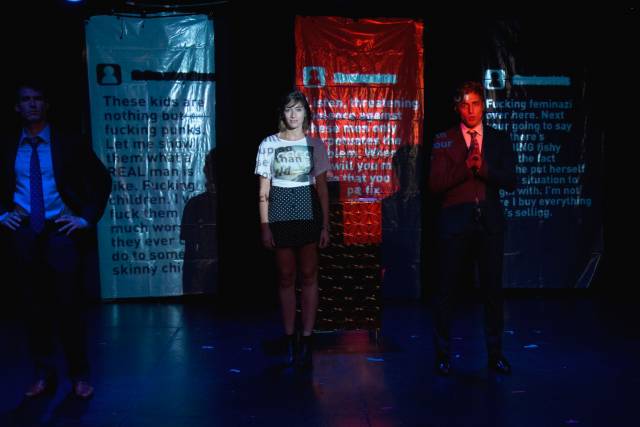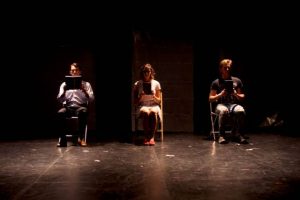

The Dirty Blondes' The American Play, written by Ashley J. Jacobson, pays strange and twisted homage to Bret Easton Ellis's novel American Psycho. It tells the story of three college students pushed to extremes, and a protagonist who finds himself committing violent and unthinkable acts in an attempt to fit in. Dark and honest, the play creates a vivid image of our society’s negligence in tackling issues of violence and rape. After a successful run at the 2015 New York International Fringe Festival -- including a Fringe Overall Excellence Award for Playwrighting -- The American Play is being presented as part of the Fringe Encores Series at the Soho Playhouse. We spoke with Jacobson about her experience reading American Psycho, rape culture, and the dark side of social media.

What was your first experience reading American Psycho like, and what made you decide to use it as a key component of the play?
Well, getting all the way through American Psycho the first time I read it was a challenge. I've always been drawn to darker things -- darker films, books, music -- but American Psycho was unique in its unapologetic, sociopathic point of view. It's a hypnotic read, though, and I found myself understanding the cult following, the obsession -- even if I wasn't getting on board myself. Reading the book makes you feel powerful, you get to BE Patrick Batemen for a while, and that power is seductive -- especially when you feel particularly powerless in your real life.
I was also coming off a short stint as an assistant on the trading floor of a small, but competitive hedge fund -- and I recognized so many of those people in the book. The competitiveness, the entitlement, the obsessive behavior -- they're not all like that, but some are like that.
Honestly, the play is actually about so much more than the novel, and I hope I've made the novel just one element out of many that actually drives the action and characters. I actually think the play could be based on any other pop culture reference and still stand. Although there is something particular sinister and frightening about people I've met that say they absolutely love Patrick Bateman.
The violence in this piece is palpable. Did you always intend to make such a violent play?
The play, to me, is more suggestive of violence than actually violent. I've seen some plays with some serious violence and intense fight choreography and that's not what I wanted to do here. I think there's something more powerful and disturbing about watching someone talk about violence in a calm, passive way -- the way Patrick Bateman does in American Psycho.
I don't think I intended to create a violent play for shock-value -- but I guess it's difficult to write a play about what makes a person turn to sexual violence as a means for power without going there.
Also, in our culture, women experience the threat of violence all the time -- and I guess I wanted to create that atmosphere for everyone in the audience. You know, SHOW IT -- show "this is what it feels like to be afraid to walk home at night."
I thought the use of the messages being projected and forming a sort of internal dialogue was very effective. Is that something you initially had part of the script or did you workshop that with the cast?
The use of social media messages was always a part of the how I wanted to tell the story, although the way it's used has developed over time. I had to scour the internet for many days and weeks and read really horrible user comments about devastating articles to find the right language that I wanted to populate the world of the play. Some example of the messages are almost verbatim from comments that actually exist, while some others are my interpretation of what is being said. The commentary on the story has it happens was an important addition to the script because I wanted to show the way social media helps us navigate situations but also creates a disturbing distance from actually experiencing pain or empathy about the actual situation. It's been interesting to see the actors develop the different voices needed to tell all those points of view.

How have you felt about the audiences' reaction to the piece? Has anything surprised you?
I feel proud that the play has sparked conversations and dialogue. It's been controversial and I guess I appreciate that over people just simply saying 'it's good' or 'they liked it.' In a way, it's not really a play people LIKE -- but it's a play that people have left the theater talking about, thinking about and coming to me with their reactions -- both positive and negative. Of course there has been some backlash -- Patrick Bateman fans and fans of the book do not appreciate me using their hero as an overarching villain and symbol of rape culture -- but you can't please everyone. And honestly, I wasn't trying to please those people -- I was trying to be problematic. It's a play that is saying something, loudly, about rape culture, the way certain types of men view and discuss women, and some people just don't want to hear it, or don't think there's anything wrong with the status quo. Our mission at The Dirty Blondes is to further a conversation -- so at least those people are coming to the theater and hearing what we have to say anyway.
What feeling or thought, if you had to pick one, would you like the audience to take away?
I want the audience to feel empowered. I want those who have felt victimized to feel emboldened and heard, and I want those who may have victimized others to examine their actions and point of view. I want the audience to feel inspired to action against those who seek to violate others, and I want the audience to feel like it's OK to speak loudly about the themes in the play. I also just want everyone to be nicer and more empathetic to each other -- you know, gender roles, sexual politics, rape culture -- it hurts EVERYONE no matter where you identify on the sexual spectrum, and I just want everyone to cut everyone else a little slack.
"The American Play" will be presented at the Fringe Encore Series, September 17-25 at the Soho Playhouse.